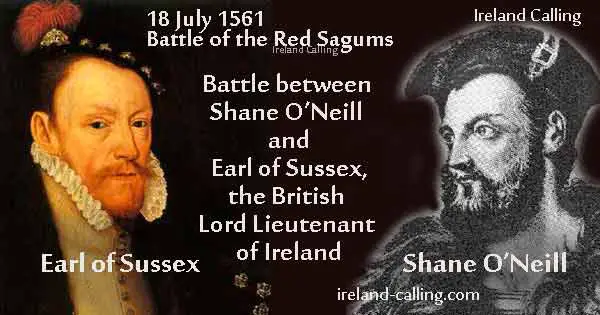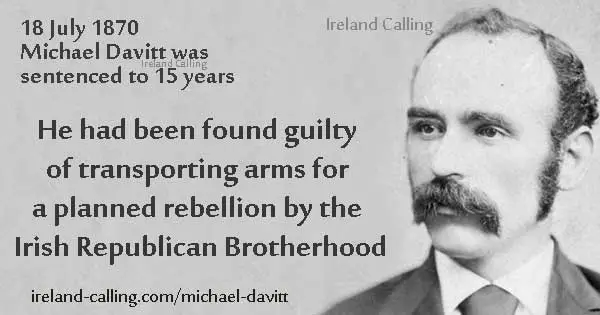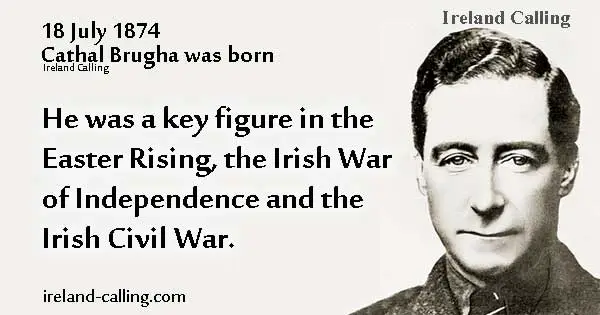july-top.html
1561 The Battle of the Red Sagums took place on this day in 1561. It was fought between Shane O’Neill and his army and the British Lord Lieutenant of Ireland, the Earl of Sussex. During the 16th century, Britain had control of much of the south of Ireland, but the province of Ulster was still divided up into various Irish kingdoms. One of these clans was led by Shane O’Neill.

Queen Elizabeth ordered Sussex to take control of Ulster, either by agreeing a deal with O’Neill or by using military force. O’Neill retreated into the mountains leaving the Sussex with no enemy to fight against. The British forces instead plundered several villages in the O’Neill territory.
As they left, O’Neill and his army struck and caught the British unaware. They attacked and killed between 50 and 400 British troops. The rest were forced to flee and the sight of their red cloaks disappearing over the horizon was where the name of the battle came from (a sagum is a military cloak).
The victory was significant for the O’Neill clan. Although it was not large in terms of numbers, it sent a message back to Elizabeth and her army that they faced a long and drawn out conflict before they would defeat the O’Neills.
Click here to read more about the history of the O’Neill family name
Click here to learn about the history of other Irish names
* * *
1870 Michael Davitt was sentenced to 15 years in prison on this day in 1870. He was an Irish nationalist and had been found guilty of transporting arms for a planned rebellion by the Irish Republican Brotherhood. Davitt was eventually released and continued to work for the rights of Irish people, often alongside Charles Parnell.
 Click here to read more about the life and achievements of Michael Davitt
Click here to read more about the life and achievements of Michael Davitt
* * *
1874 Cathal Brugha was born in Dublin on this day in 1874. He was born into a mixed family, with his father being a Protestant, disowned by his family for marrying a Catholic woman.
Brugha left school at 16 and set up a candle manufacturing business with his brothers. In the 1910s, he became involved with the Irish nationalist movement and joined the Irish Republican Brotherhood.
He then graduated to a Lieutenant in the Irish Volunteers, and was second-in-command to Éamonn Ceannt in the Easter Rising of 1916. Brugha was shot by the British Army during the battle, and was too injured to retreat when the order was given. Instead, he continued to fire at the British so that his comrades could escape safely. Ceannt reportedly found Brugha bleeding to death with his pistol in hand singing God Save Ireland.

Brugha survived the injury and became a leading figure in the Irish Republican Army. He was elected as a Sinn Féin MP for the County Waterford in 1918 and chaired the first meeting of Dáil Eireann in 1919 when the Irish politicians refused to take their seats in Westminster.
At this time, the Irish War of Independence was taking place between the Irish Republican Army and the British forces stationed in Ireland. Michael Collins was co-ordinating guerrilla attacks on the British soldiers, so they were never given the chance to use their superior military resources to the full.
Brugha disagreed with Collins’ approach to the war. He felt that the IRA’s conduct was damaging the credibility of the Dáil in the eyes of Britain and the rest of the world. He proposed that no attack should be initiated on British soldiers unless they were first given the chance to surrender. He also wanted to move the battlefield to England, to make the attacks more difficult to defend against. Both these suggestions were dismissed by Collins and the high ranking officers of the IRA.
When the Anglo-Irish Treaty was signed by Collins and Arthur Griffiths in December 1921, Brugha voted against it in the Dáil. During the debates, he criticised Collins and tried to undermine him by calling him a ‘middle-ranking’ officer of the IRA. The Dáil voted in favour of the Treaty by a narrow margin of 64 to 57. Some historians have argued that Brugha turned the vote on himself, by making it a ‘popularity contest’ between him and the charismatic Collins.
He lost his position in the Dáil as a result of the vote. In the months that followed, many of the anti-Treaty IRA planned to rebel against the newly formed Irish Free State government. Brugha actively tried to persuade them that it was not the best course of action.
He tried to persuade Rory O’Connor to abandon his position after seizing the Four Courts but to no avail. Instead he was ordered to lead another group of rebels in seizing the area around O’Connell Street in Dublin to ease the pressure on the Four Courts.
Brugha did this reluctantly and the Civil War began when Collins ordered his Free State Army to open fire on the Four Courts after one of his soldiers was kidnapped.
The Free State Army was too strong for the anti-Treaty fighters and most of the O’Connell Street rebels retreated when the buildings they had occupied caught fire. Brugha ordered his men to surrender but refused to do so himself. He was shot in the leg by a Free State soldier, and bled to death. He is buried at Glasnevin Cemetery in Dublin. Brugha’s wife Caitlín, and son Ruairí both went on to become politicians as representatives for Sinn Féin and Fianna Fáil respectively.
Discover his story
Click here to read more about the Easter Rising
Click here to read more about the Irish War of Independence
* * *
1920 In the late evening of 19th July 1920, a group of IRA soldiers ambushed four members of the Royal Irish Constabulary at Tuam in Co Galway. Two of the policemen were killed and the other two surrendered and were released unharmed.
The attack was one of many carried out by The IRA during the War of Independence.
It provoked an angry reaction from the British forces. Members of the police later rioted in the Tuam, burning down the town hall and a drapery warehouse. The riot was copied by other forces in the RIC across the country in the following months.
Click here to read more about the Irish War of Independence
* * *
1978 Happy birthday to Annie Mac, born in Dublin on this day in 1978. She is a DJ and presenter, who has been a regular on Irish and British radio and television since the mid-2000s. Mac is a regular host on numerous BBC Radio One shows, and has worked alongside other popular broadcasters including Reggie Yates and Nick Grimshaw.
* * *
1999 Boyzone singer Shane Lynch narrowly escaped death after being involved in a rally car accident. The pop star was taking part in the Enterprise National Rally in South Wales. He was driving at more than 100mph when he lost control and his vehicle overturned.
Thankfully, both Lynch and his co-driver were not seriously injured in the accident. The Dublin-born star was back in his car later that same day to complete the race.
Click here to read about more great Irish singers
july-bottom.html